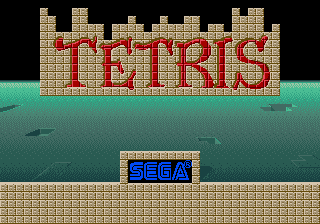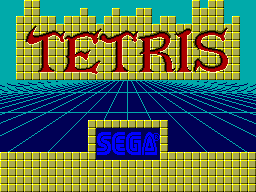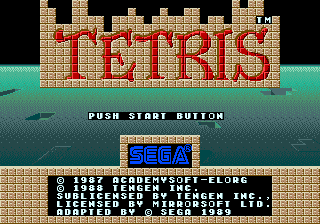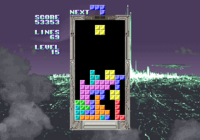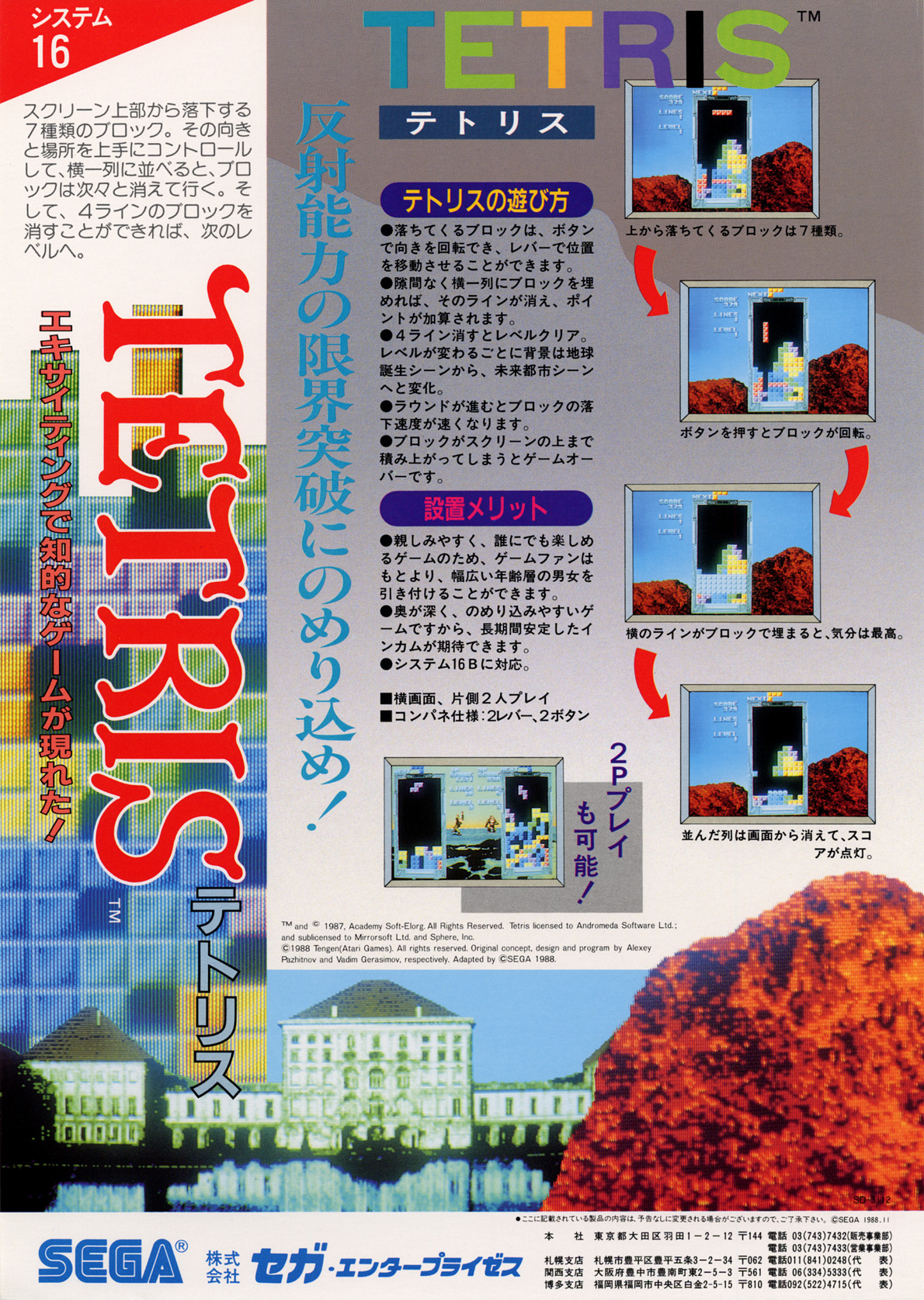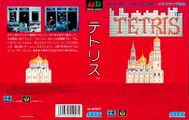Tetris
From Sega Retro
- For the Mega Drive Mini version, see Tetris (Mega Drive Mini).
| ||||||||||||||||||||||||||
| Tetris | ||||||||||||||||||||||||||
|---|---|---|---|---|---|---|---|---|---|---|---|---|---|---|---|---|---|---|---|---|---|---|---|---|---|---|
| System(s): Sega System 16, Sega Mega Drive, Sega System E, Sega Mega-Tech, Taito B-System, Taito H-System | ||||||||||||||||||||||||||
| Publisher: Sega Enterprises, Ltd. | ||||||||||||||||||||||||||
| Developer: Esco Boueki[1] Sanritsu | ||||||||||||||||||||||||||
| Licensor: Tengen Atari Games Mirrorsoft Andromeda Software Elektronorgtechnica | ||||||||||||||||||||||||||
| Sound driver: Pre-SMPS Z80 | ||||||||||||||||||||||||||
| Genre: Puzzle[2] | ||||||||||||||||||||||||||
| Number of players: 1-2 | ||||||||||||||||||||||||||
|
Tetris (テトリス) is a tile-matching puzzle game based around falling blocks. The name is derived from combining the Greek numerical prefix tetra- (the falling pieces contain 4 segments) and tennis.
Tetris was originally created by Alexey Pajitnov; he developed the first version of the game for Soviet Elektronika 60 terminal computers. Sega produced two arcade versions (a System 16 version and a System E version), a Mega Drive version, and a Mega Drive Mini version.
Contents
Gameplay
The Sega versions of Tetris are played against backgrounds seemingly sourced from around the world depicting scenes of world evolution. As the player's level increases, the background changes, developing from the earliest known history of the Earth to a futuristic city. A preview of the next Tetrimino can be seen above the Tetris playing field.
The Sega versions of Tetris are more "rigid" than later games, only allowing for pieces to be rotated if there is room (i.e. a piece is not "pushed" left or right if there is space to do so, and the player is not given the chance to rotate a piece shortly before it stops). This ruleset, called Sega rotation, became a fixture in Sega's other Tetris-inspired games during the late 1980s and 1990s, and became a de facto standard for Japanese Tetris games including Arika's Tetris: The Grand Master series (until The Tetris Company established official standards in the early 2000s).
The System 16 version of Tetris also includes a talking monkey which acts as a guide during the attract sequence. Monkeys would appear in later Sega-published Tetris titles as well. Also, while Tetris became would become synonymous with Russian folk songs (most notably, "Korobeiniki"), the Sega soundtrack is entirely original. In addition, as the speed of the game increases, the the tempo of the main theme also gets faster.
History
Tetris was conceived by Alexey Pajitnov and he developed the first version for Elektronika 60 computers. Pajitnov ceded all the rights to Tetris to the Soviet government for a ten year period in 1986. Elektronorgtechnica (or simply Elorg), an organization owned by the Soviet government at the time, would be responsible for the licensing of any Tetris rights.
Sega of America representitive Steve Hanawa "discovered" Tetris on behalf of the company during the development of Monopoly.[5] Hanawa noticed the Monopoly team working on a PC version of Tetris, and he became addicted to it after trying it out. Hanawa introduced Tetris to Sega of Japan, and the latter acquired the Japanese arcade and Mega Drive "rights" from Tengen. Tengen held what was believed to be the arcade and console rights at the time. The "rights" had passed through other companies before reaching Tengen; Tengen had been given the "rights" from their parent company, Atari Games, Atari Games licensed them from Mirrorsoft, and Mirrorsoft licensed them from Andromeda Software.
Andromeda's belief that they had the ability to sell any arcade and console rights to Tetris stemmed from a contract between them and Elorg (signed on 10 May 1988); the contract gave Andromeda the rights to Tetris for home computers and "different types of computers"; the phrase was vague enough for Andromeda to believe that it meant things like arcade systems and consoles.
Release
The System 16 version of Tetris was a hit in Japan, prompting additional versions of the game to be made for different arcade hardware - one for Sega's System E hardware, and two for Taito's B-System and H-System boards. The B-System versions were released as upgrade kits for Taito's Nastar and Master of Weapon; the H-System version appears to have been sold on modified boards that previously held Taito's Go for the Gold (released overseas as Recordbreaker) rather than as an upgrade kit. Although the arcade rights Sega received from Tengen were not legitimate at the time of their arcade versions' releases, those arcade versions would eventually be legitimatized after Andromeda signed a contract with Elorg on 26 February 1989 granting Andromeda the ability to sub-license arcade rights to Tetris legitimately.
Sega planned to release their Mega Drive version of Tetris on 15 April 1989[6], but they suddenly cancelled shipments of the title[7] after they learned the Mega Drive "rights" they acquired were bogus. It is thought that fewer than 10 cartridges were produced, and some of the copies that survived were sold in auctions for up to US$16,000 (one signed copy was infamously sold for US$1,000,000,000). In an interview with Hiroyuki Miyazaki about the Mega Drive Mini, Miyazaki stated that he would have been fired if he had known what happened to the unreleased copies.[8] Despite Sega's efforts, the game quickly became widespread in the unlicensed Mega Drive market, becoming so common as to even appear in the 1992 Jackie Chan film Police Story 3: Supercop.[9]
While Sega's arcade versions of Tetris could actually be legitimatized, their Mega Drive version could not - a second version of Elorg and Andromeda's computer contract (signed on 23 February 1989) had a definition of a computer added to it, and the Mega Drive version did not fit the new definition. In addition to the amended contract, a seperate contract between Elorg and Nintendo granted the latter all console rights. Despite all this, Sega was able to port the Mega Drive version over to their arcade-based Mega-Tech hardware.
Legacy
Atari Games, the company responsible for giving Sega the Japanese arcade rights through Tengen, stopped paying Mirrorsoft at some point. This resulted in Mirrorsoft not having enough money to pay Andromeda, and Andromeda not having enough money to pay Elorg. Because of this, Elorg decided to terminate their arcade rights deal with Andromeda in February 1992.[10][11] The termination meant that Sega could no longer distribute their arcade versions of Tetris legally.
Despite the Mega Drive version's legal complications and subsequent cancelled release, bootleg versions of the game quickly found their way onto the unlicensed market, with reports of it's availability first appearing in November 1989.[12] Notably, a bootleg copy of Tetris is seen being played in the Jackie Chan action film Police Story 3: Supercop[9], which began filming around late 1991 - demonstrating just how much traction this version had gained in the unlicensed market since then.
Sega's versions of Tetris introduced the concept of Sega rotation, which would influence many of the Tetris games made in the future. In addition to that, Sega's choice of music and aesthetics were adapted for the Sega Saturn game Tetris-S and the 1999 release of Sega Tetris.
Sega Ages 2500 Series Vol. 28: Tetris Collection, a licensed compilation of Tetris games for the PlayStation 2, includes the cancelled Mega Drive version of Tetris.
Production credits
- Main article: Tetris/Production credits.
Magazine articles
- Main article: Tetris/Magazine articles.
Promotional material
Physical scans
System 16 version
Mega-Tech version
Mega Drive version (unreleased)
| Sega Retro Average | |||||||||||||||||||||||||||||
|---|---|---|---|---|---|---|---|---|---|---|---|---|---|---|---|---|---|---|---|---|---|---|---|---|---|---|---|---|---|
|
| 74 | |
|---|---|
| Based on 5 reviews | |
System E version
Master System version
Technical information
- Main article: Tetris/Technical information.
ROM dump status
| System | Hash | Size | Build Date | Source | Comments | |||||||||
|---|---|---|---|---|---|---|---|---|---|---|---|---|---|---|
| ✔ |
|
360kB | 1989 | Cartridge | ||||||||||
| ✔ |
|
256kB | 1989 | Cartridge (JP) |
References
NEC Retro has more information related to Tetris
|
- ↑ http://gdri.smspower.org/wiki/index.php/User:Andlabs/Sega (Wayback Machine: 2021-09-04 11:55)
- ↑ File:Tetris MD JP Box.jpg
- ↑ Mega Drive Fan, "June 1992" (JP; 1992-05-08), page 75
- ↑ Game Machine Daikenkyuu (JP; 1989-10-15), page 77
- ↑ https://www.sega-16.com/2011/10/interview-steve-hanawa/
- ↑ Blog Post (with ad scans): "[思い出] 1989年メガドライブのテトリス未発売で起きた私達だけのテトリス事件、メガドライブミニ収録記念"
- ↑ Game Machine, "1989-05-01" (JP; 1989-05-01), page 26
- ↑ https://www.digitaltrends.com/gaming/sega-talks-sega-genesis-mini-development-process/ (Wayback Machine: 2019-09-22 22:27)
- ↑ 9.0 9.1 File:References PoliceStory3Supercop Film Tetris MegaDrive.png
- ↑ "Game Over: How Nintendo Conquered the World" by David Sheff
- ↑ http://www.filfre.net/2017/08/a-tale-of-the-mirror-world-part-8-life-after-tetris/ (Wayback Machine: 2017-08-04 16:09)
- ↑ Popular Computing Weekly, "Nov 30 - Dec 6 1989" (UK; 1989-11-30), page 3
- ↑ 1700 igr dlya Sega, "" (RU; 2001-xx-xx), page 310
- ↑ ACE, "August 1990" (UK; 1990-07-xx), page 59
- ↑ Cool Gamer, "9" (RU; 2002-10-13), page 223
- ↑ Sega Power, "October 1991" (UK; 1991-09-05), page 54
- ↑ Sega Opisaniy i sekretov, "14000 Opisaniy i sekretov" (RU; 2003-03-11), page 200
| Tetris | |
|---|---|
|
Main page | Comparisons | Credits | Hidden content | Magazine articles | Video coverage | Reception | Region coding | Bootlegs
| |
| Tetris and Tetris-like games for Sega systems/developed by Sega | |
|---|---|
| Sega: Tetris (1989) | Flash Point (Mega Drive) (1989) | Bloxeed (1989) | Sega Tetris (1999) | Sega Ages 2500 Series Vol. 28: Tetris Collection (2006) | Tetris Giant (2010) | Puyo Puyo Tetris (2014) | Tetris (2019) | Puyo Puyo Tetris 2 (2020) | |
| Third-Party: Blockout (1991) | Tetris Plus (1996) | Tetris S (1996) | Tetris 4D (1998) | The Next Tetris: On-Line Edition (2000) | Tetris Kiwamemichi (2004) | Tetris The Grand Master 4: The Masters of Round (unreleased) | |
| Unlicensed: FA Tetris (1990) | Super Columns (1990) | Super Tetris (19xx) | Flashpoint (19xx) | |
| Tetris related media | |
| Tetremix (1989) | Flash Point/Bloxeed (1990) | New Century (2006) | Puyo Puyo Tetris 1 & 2 Original Soundtrack (2020) | |
- 1-2 player games
- All arcade games
- System 16 games
- 1988 System 16 games
- All 1988 games
- System E games
- 1989 System E games
- All 1989 games
- Mega-Tech games
- Unknown year games
- JP Mega Drive games
- All JP games
- Mega Drive games
- 1989 Mega Drive games
- Mega Drive puzzle games
- All puzzle games
- All games
- Missing ROM hashes
- Games with vague size
- Old technical information
- Tetris
- Tetris (franchise)
- Sega Arcade Games Not On Sega Hardware
